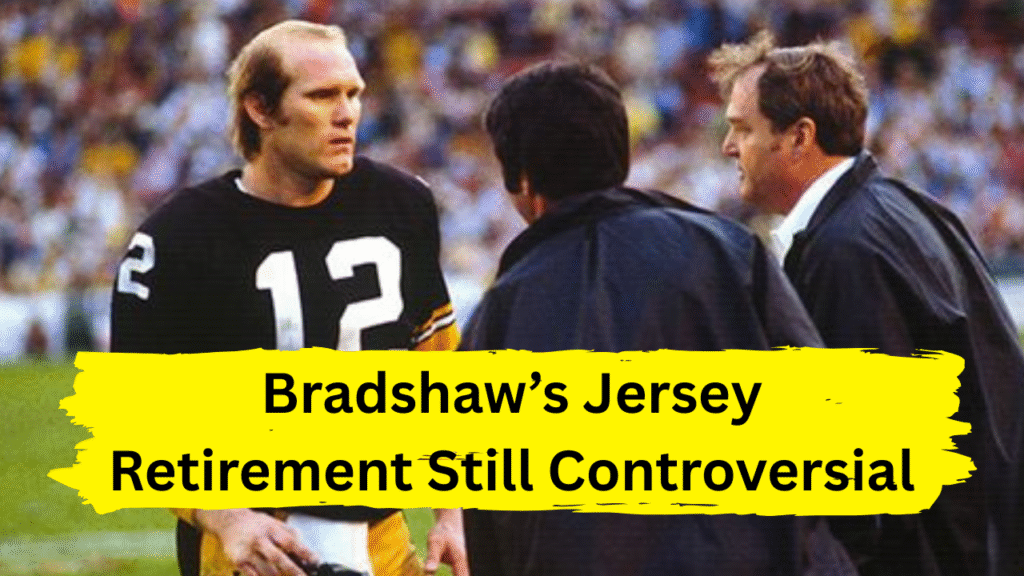The Pittsburgh Steelers, a franchise synonymous with dynastic success and iconic players, find themselves embroiled in a growing debate over one glaring omission: the official retirement of Terry Bradshaw’s No. 12 jersey. Despite Bradshaw’s unparalleled contributions to the team’s 1970s golden era—four Super Bowl titles, two Super Bowl MVP awards, and a Hall of Fame legacy—the Steelers have yet to grant him the honor bestowed on only three players in their history: Ernie Stautner, Joe Greene, and Franco Harris . This delay has sparked frustration among fans and analysts alike, raising questions about the organization’s priorities and its reverence for its legends.
A Legacy Unmatched
Bradshaw’s credentials are indisputable. As the first quarterback to win four Super Bowls, he anchored the Steelers’ 1970s dynasty, throwing for 932 yards and nine touchdowns across those championship games—records at the time of his retirement . His “Immaculate Reception” pass to Franco Harris in 1972 remains etched in NFL lore, and his powerful arm and leadership transformed Pittsburgh into a football powerhouse . Statistically, Bradshaw’s career—27,989 passing yards, 212 touchdowns, and an NFL MVP award in 1978—solidifies his place among the sport’s all-time greats . Yet, while his No. 12 has not been reissued since his 1983 retirement, it lacks the formal recognition given to Greene’s No. 75 or Harris’ No. 32 .
The Steelers’ Cautious Tradition
Pittsburgh’s reluctance to retire jerseys stems from a self-imposed high standard. Only three numbers hang in the rafters of Acrisure Stadium, a remarkably low figure for a team with six Super Bowl titles. By comparison, the Chicago Bears and New York Giants have retired 14 jerseys each . The Steelers’ conservative approach prioritizes longevity and cultural impact, as seen with Greene (retired in 2014 after 13 seasons) and Harris (retired in 2022, 50 years after the “Immaculate Reception”) . However, this selectivity now risks appearing dismissive. As insider Gerry Dulac noted, the team’s delayed recognition of Harris—whose ceremony occurred posthumously after his sudden passing in 2022—serves as a cautionary tale .
The Urgency of Time
At 76 years old, Bradshaw’s advancing age and recent health struggles amplify calls for urgency. In 2025, he announced his retirement from Fox NFL Sunday, citing health concerns, though he plans to remain with the network until 2029 . Fans fear a repeat of the Harris scenario, where the Steelers’ procrastination led to a memorial rather than a celebration. Dulac, while acknowledging Bradshaw’s eventual honor, bluntly stated, “I don’t think it’s happening anytime soon” . This stance has drawn criticism, particularly given Bradshaw’s symbolic importance to the franchise’s identity.
The Unofficial Honor vs. Formal Recognition
The Steelers have unofficially retired several numbers by withholding them from circulation, including Bradshaw’s No. 12, Hines Ward’s No. 86, and Troy Polamalu’s No. 43 . Yet this practice feels insufficient for a figure of Bradshaw’s stature. As one columnist argued, “If retiring a player’s jersey means something, then do it while the player is alive” . The distinction between unofficial and official retirement carries emotional weight, particularly for a fanbase that reveres its history.
Broader Implications: Ben Roethlisberger’s Future
The Bradshaw debate also intersects with the legacy of Ben Roethlisberger, another Steelers icon. Roethlisberger, a two-time Super Bowl champion, is widely expected to receive jersey retirement honors after his 2027 Hall of Fame eligibility . However, delaying Bradshaw’s recognition sets a precarious precedent. If the Steelers continue to defer, they risk overcrowding future ceremonies or diminishing the significance of the honor.
A Test of Organizational Values
The Steelers’ hesitation reflects a tension between tradition and modernity. While the team’s selective jersey retirements underscore a commitment to exclusivity, they also risk alienating a fanbase eager to celebrate living legends. Bradshaw’s case is not merely about a number—it’s about affirming the bond between a franchise and its heroes. As the Steelers navigate this dilemma, their decision will resonate beyond Bradshaw, shaping how future legends like Roethlisberger are honored.
Conclusion: A Call for Timely Recognition
Terry Bradshaw’s legacy is woven into the fabric of the Steelers’ identity. His absence from the retired jersey list feels increasingly incongruous, a oversight that undermines the team’s storied narrative. By postponing his honor, the Steelers risk diminishing the emotional resonance of the gesture. For a franchise built on tradition, the time to act is now—before history repeats itself, and another legend’s ceremony becomes a memorial.
For further reading on Steelers history and legacy, explore the sources cited in this article.


